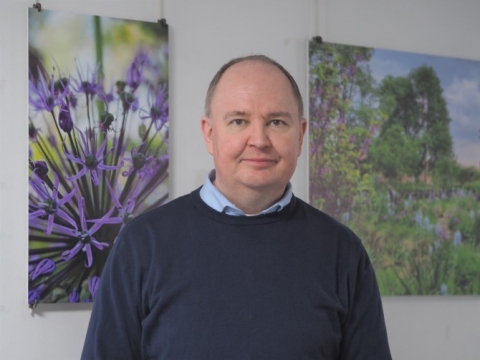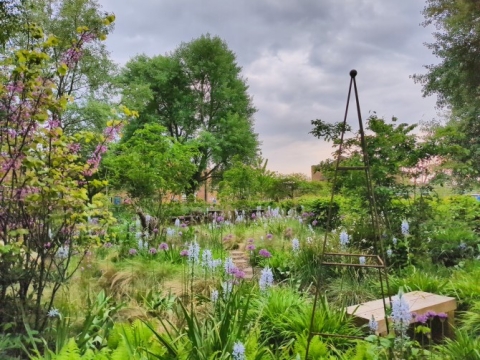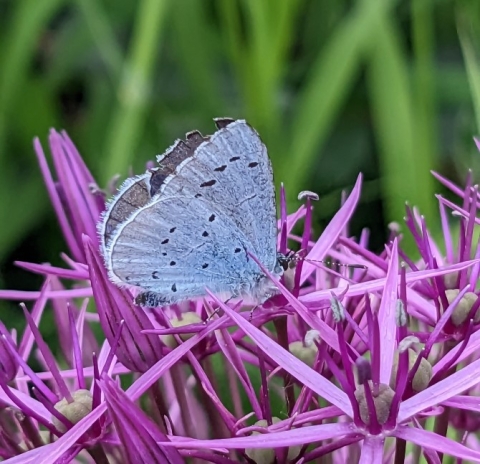An extraordinary exhibition of photography, taken by a heart transplant patient, has been displayed at Harefield Hospital, called: ‘The more you look, the more you see’.
53 year-old Ian Hilliard, a software developer from mid-Wales, was admitted to Harefield’s critical care in January 2023 with heart failure. Too unwell to leave, Ian spent more than 21 months at Harefield until he had a heart transplant in September 2024. The exhibition reflects Ian’s journey as he looked to keep his mind and body active while in hospital.
From quick snaps of Harefield’s gardens, Ian began to use photography as meditation, capturing seasonal changes in plant life and wildlife species.
Harefield Hospital sits in an extensive area of countryside. Biodiversity thrives in its three cultivated gardens, two large ponds, honey-producing apiary, and its wildflower meadow.
He says: “When I first came to Harefield, I was told it would be a long wait, and I wasn’t very mobile. It was about four months until I was able to visit the nearest garden. But day by day I was able to venture further – to the Healing Garden, over to the helipad field, then as far as the two lakes.
“I would spend hours outside. And the more I photographed, the more I saw. I noticed how quickly the colours of the flowerbeds changed each season. I spotted 16 species of butterfly, including the beautiful Holly Blue. I began to concentrate on the detail of plants, and the insects within them.
“Going outside is an escape from the poking and prodding and hospital machine noises. It was important for me to focus on something, to give each day a purpose. Photographing the wildlife became part of my routine. It’s lovely to see it come to life in the exhibition.”
Ian’s photographs capture the details of Harefield’s plant life and wildlife species, such as the vivid colours of flowers and the wide variety of insects that live within them.
Following his heart transplant, Ian was fit enough to go home within two weeks. He is still a patient at Harefield, now only visiting for his clinical team to check his progress. He wants to share his gratitude for the community at Harefield who supported him, and raise awareness about organ donation.
He said: “This was a big journey for me. Waiting for a donor heart wasn’t easy and there were a couple of times I had covid or sepsis, making me even more unwell. But I believe the top of the mountain doesn’t seem so high if you just focus on taking the first step. I prioritised achieving one thing each day, even if, on some days, that was stretching my arms up and down.
“You’re not alone in a hospital environment and the friendships I formed with so many different people – doctors and nurses, security staff, porters, garden volunteers, canteen staff, the arts team, not to mention my fellow patients, who I’d share walks and meals with – they all felt like part of my treatment, and now feel like an extended family.
“I am so lucky to have been gifted this donor heart. Many things I thought I’d never do or see again are back on the table. And even though my own heart didn’t serve me long enough, I discovered I had three valves that could potentially be used again, and the organ itself I donated for research purposes. I would encourage everyone to consider signing up to the Organ Donor Register – it can be life changing.”
Ian has historical family connections in Hillingdon, including with Ickenham Hall and Cowley Manor. He has always been a keen hobby photographer, having got his first camera aged 10, and has travelled the world taking the opportunity to capture its people and places.
Ian’s photography is being displayed at Harefield Hospital for staff, patients and their visitors until the end of May, after which a number of the prints will be displayed in wards.
Contact information
If you're a journalist and have a media enquiry, please contact us.
Phone: 020 7188 5577
Email: press@gstt.nhs.uk



